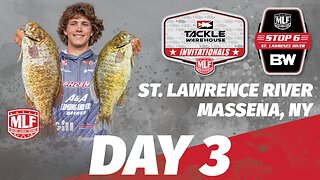Premium Only Content

10 Sports Betting Tips/ Make Better Sports Picks
Money management as well as a "Good Defense"
Most of us concentrate on profitable betting systems and strategies. After all, we won't make any money unless we have a good betting system, right? The same can be said for "money management." That is, if you do not pay attention to money management, you may be unable to take the "next" step toward becoming a "sports investor." Extreme spending will be reduced if you manage your money well.
Many financial professionals use the terms "risk management" and "money management" interchangeably. What are we attempting to accomplish by focusing on "money management"? In other words, we're attempting to "manage our money" – or "manage our risk." Our goal is to keep our capital, or hard-earned money, safe. We want to reduce the possibility of loss – or, in a broader sense, to reduce our "risk."
This content is solely for entertainment and educational purposes. It is prohibited to use this information in violation of any federal, state, or local laws.
Betting on a flat rate
First and foremost... We believe that "flat" betting is the best option. That is, for each play, bet the same amount. It is not a good idea to “chase” or increase your bet size based on your previous bet (or series of bets). (This is true for the vast majority of people; see * Note * below.)
You may have heard about various systems where you increase your bet size "knowing" you are going to win over time.
In general, many of these approaches MAY APPEAR TO IMPROVE SHORT-TERM PERFORMANCE – BUT AT THE HIGHEST COST OF INCREASING YOUR RISK OF SUCCESS. A bad streak can quickly deplete your bankroll. If you do succumb to the allure of various Martingale systems, please use a method of systematic risk management. It pays to reduce your risk of failure in the sports investing business.
Professional money managers, as well as prudent sports investors, will agree that you should try to avoid "blowing out" your investment portfolio. Flat betting will assist you in staying the course and riding the ups and downs of investing.
*Note *: Experienced gamblers may employ a variation of the Martingale or “chase” systems – but they will always employ some form of risk management.
Dimensions of the Unit
Following that, consider the type of investor you are. Are you more aggressive or more conservative? Are you an expert or a beginner? The answers to these questions will help you determine the typical size of your bet. This is referred to as your "unit" size.
We usually recommend that a sports investor bet 1% – 3% of their bankroll on each bet. Conservative sports investors (or newcomers) should bet 1% to 2% on a play. It is worth noting that professionals are typically in the 1% range.
Sports investors who are willing to bet 3 percent on a play may want to do so. 2 percent is a good middle ground; it allows you to weather a losing streak while also contributing to the growth of your sports investing bankroll. Extremely aggressive investors may bet 4% or 5% of their bankroll on a single bet, but this is too risky for most investors.
Why not 4 percent or 5%? Streaks and the risk of ruin, in a nutshell. If you bet too much money, a bad streak could cut your bankroll in half (or worse). You may then feel compelled to reduce your bet size – just in time for the inevitable hot streak. Smaller bet sizes are more prudent and allow you to stick to your strategy while remaining disciplined.
The terms "true" bankroll and "risk capital" are used interchangeably.
When we talk about bankroll percentages, most casual bettors believe they are on the “high end” of the ranges we discuss. This may appear to be true – but only because most casual bettors' "true bankroll" is greater than what they have in their accounts. That is, many bettors may have $X in their accounts but are willing to add another $Y if their account is depleted. Professionals are usually aware of their "full bankroll" and need to protect their "capital" versus "risk of ruin."
Investors – and, in this case, sports investors – must be aware of their “true bankroll” or “risk capital (allocated to sports).” When investors examine their finances carefully, they may gain a better understanding of the "true" level or amount they allocate to sports investing. They may then realize that 1% to 2% of their "true bankroll" or "risk capital" is a reasonable bet size.
In essence, good "money management" is similar to good defense. Money management will allow you to "stay in the game" during difficult times, allowing you to capitalize on good handicapping strategies (your offense).
Now, take your betting by the reigns with these Three websites. What we have compiled for you are Three game-changers ranging from maximizing your Fantasy League potential and Draft Kings earnings; to two tiers of online sports betting systems that accommodate your budget.
Follow these links, see what fits you, and may the odds be in your favor!
Betting Gods: https://bit.ly/3xnIieb
Betting Gods is what I call a tipster stable. This means that it is an online service that unites a variety of different tippers on a single platform (the same roof). This enables Betting Gods to manage their tipsters' services, market them, and, most importantly, ensure that the best quality tips are made available to you as a punter.
Every day, people who have signed up for free tips receive a tip from one of Betting Gods' many services. There aren't many good quality tipster services that give away something like this, so this is quite unique, and demonstrates their level of confidence in their services, which is very encouraging.
Z-Code: https://bit.ly/3qR69k5
The ZCode System is an automated betting tool that offers gamblers a variety of winning sports predictions on the most popular sports. The ZCode system functions similarly to a betting robot, providing a detailed analysis based on a variety of gaming factors such as performance history and a variety of other factors.
Over 80 parameters are used to make precise predictions of specific matches. The most commonly used parameters include a player's condition, goalies, injuries, feuds, events, trainers, rivalries, and many others. All of these factors, as well as others, are critical in determining the outcome that will provide the best value in all matches.
The ZCode system isn't just for predicting whether you'll win or lose a particular match. However, it aids gamblers in their quest for the best value with the least amount of risk. The system is based on a unique algorithm that takes into account all relevant information about different matches to provide a valuable prediction.
The system took many years to develop, and it was then put through extensive live beta testing. All results were broadcast live on the ZCode system's Facebook page. All ZCode Facebook fans were able to see how the system made predictions.
Draft Dashboard: https://bit.ly/3qRjHMH
To determine who the best players on the slate are, Draft Dashboard employs a proprietary algorithm known as DashRankTM. The software examines important DFS statistics as well as upcoming matchups. It assigns a DashRank to each player ranging from 0 to 100, with 0 being the worst and 100 being the best.
The DashRankTM represents a player's likelihood of scoring fantasy points in the upcoming game. Over time, players with higher DashRanks tend to outperform those with lower DashRanks.
The Lineup Optimizer is Draft Dashboard's signature feature, and it has some transcendent features that are both unique and useful. When you launch the optimizer, you'll see a full roster, the salaries of the rostered players, and their DashRanks. You can now save the roster, create a new one, or improve on it.
-
 1:36
1:36
KGUN
4 years agoCraig: Sports Betting
40 -
 1:36
1:36
WMAR
4 years agoSports betting laws take effect today
27 -
 3:09
3:09
WSYM
4 years agoMI Sports Betting
36 -
 2:46
2:46
WGBA
4 years agoEvers, Oneida sign deal to allow sports betting
11 -
 1:54
1:54
KGTV
4 years agoCalifornia voters get to decide on sports betting
16 -
 38:09
38:09
The Mel K Show
1 hour agoMel K & Tim James | Are Hidden Dangers Lurking in Your Mouth? | 7-27-25
1.71K1 -
 LIVE
LIVE
Major League Fishing
2 days agoLIVE Tackle Warehouse Invitationals, Stop 6, Day 3
2,878 watching -
 LIVE
LIVE
LumpyPotatoX2
3 hours agoKilling Floor 3 + SoulFrame: Co-op Showcase - #RumbleGaming
110 watching -
 LIVE
LIVE
TheItalianCEO
3 hours agoPlaying video games on a Sunday since 1989
237 watching -
 28:43
28:43
Liberty Hangout
3 days agoAnti-Trumpers Don't Know What They're Protesting
27K178